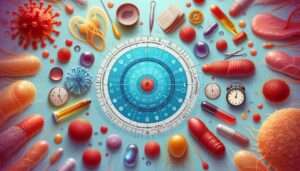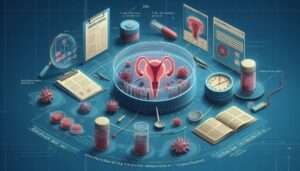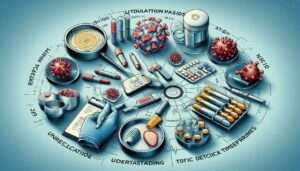STD Incubation Periods: Understanding Detection Timeframes
Sexually transmitted diseases (STDs) are a common concern for many sexually active individuals. One of the most pressing questions people have is how long it takes for STD symptoms to appear after potential exposure. This comprehensive guide will explore the incubation periods of various STDs, testing windows, and important information to help you make informed decisions about your sexual health.

Table of Contents
ToggleWhat is an STD Incubation Period?
Before diving into specific STDs, it’s crucial to understand what an incubation period means. The incubation period is the time between when you’re exposed to an STD and when symptoms first appear or when the infection can be detected through testing.
The Ultimate Guide to Using Condoms: Everything You Need to Know for Safe and Enjoyable Sex
It’s important to note that incubation periods can vary widely depending on the specific STD and individual factors. Some people may never develop noticeable symptoms, which is why regular testing is essential for sexually active individuals.

Common STDs and Their Incubation Periods
Chlamydia
Incubation period: 7-21 days
Chlamydia is one of the most common bacterial STDs. While symptoms may appear within a week of exposure, it can take up to three weeks for signs to develop. Many people with chlamydia don’t experience any symptoms at all, making regular testing crucial.
Gonorrhea
Incubation period: 1-14 days
Gonorrhea is another bacterial STD with a relatively short incubation period. Symptoms can appear as soon as 24 hours after exposure, but it may take up to two weeks for signs to develop.
Understanding Condom Sizes: A Comprehensive Guide to Choosing the Right Fit
HIV
Incubation period: 2-4 weeks for early symptoms, up to 3 months for antibody detection
Human Immunodeficiency Virus (HIV) has a complex incubation period. Some people may experience flu-like symptoms within 2-4 weeks of exposure, known as acute HIV infection. However, it can take up to three months for the body to produce enough antibodies for accurate testing.
Syphilis
Incubation period: 10-90 days (average 21 days) Syphilis progresses through several stages, with the primary stage typically appearing within 3 weeks of exposure. However, it can take up to 90 days for the initial symptoms to develop.
Herpes (HSV-1 and HSV-2)
Incubation period: 2-12 days Herpes simplex virus (HSV) can cause oral or genital herpes. The first outbreak typically occurs within 2-12 days after exposure, but some people may not experience symptoms for months or years.
Sexually Transmitted Infections (STIs): A Comprehensive Guide to Understanding, Prevention and Treatment
Human Papillomavirus (HPV)
Incubation period: 1 month to years HPV has a highly variable incubation period. Some people may develop genital warts within a month of exposure, while others may not show any signs for years. Many people clear the virus without ever developing symptoms.
Hepatitis B
Incubation period: 60-150 days (average 90 days) Hepatitis B has a longer incubation period compared to many other STDs. It can take 2-5 months for symptoms to appear, and some people may never experience noticeable symptoms.
Do Condoms Expire? Everything You Need to Know About Condom Safety and Shelf Life
Factors Affecting STD Incubation Periods

Several factors can influence how quickly symptoms appear or how soon an STD can be detected:
- Individual immune response
- Viral or bacterial load at the time of transmission
- Presence of other infections or health conditions
- Use of medications or treatments
It’s important to remember that these factors can cause variations in incubation periods, which is why following recommended testing guidelines is crucial.
Dental Dams: The Ultimate Guide to Safer Oral Sex
When to Get Tested for STDs
Given the variability in incubation periods, it’s essential to follow proper testing guidelines. Here are some general recommendations:
- Get tested immediately after potential exposure for a baseline result.
- Follow up with testing at appropriate intervals based on the specific STDs of concern.
- For HIV, get tested at 6 weeks, 3 months, and 6 months after potential exposure.
- For most other STDs, testing at 2 weeks and 3 months post-exposure is often recommended.
Always consult with a healthcare provider for personalized testing advice based on your specific situation and risk factors.

The Importance of Regular STD Testing
Regular STD testing is crucial for several reasons:
- Early detection leads to earlier treatment and better outcomes.
- It helps prevent the spread of STDs to sexual partners.
- Many STDs can be asymptomatic, meaning you could have an infection without knowing it.
- Regular testing promotes overall sexual health awareness and responsible behavior.
The Centers for Disease Control and Prevention (CDC) recommends annual STD testing for sexually active individuals, with more frequent testing for those with multiple partners or other risk factors.
Prevention and Safe Practices
While understanding incubation periods is important, prevention is key to maintaining sexual health. Here are some essential safe practices:
- Use barrier methods like condoms and dental dams consistently and correctly.
- Limit your number of sexual partners.
- Get vaccinated against preventable STDs like HPV and Hepatitis B.
- Communicate openly with partners about sexual health and testing.
- Consider pre-exposure prophylaxis (PrEP) if you’re at high risk for HIV.
Conclusion:
Understanding STD incubation periods is crucial for making informed decisions about your sexual health. Remember that symptoms aren’t always present, and incubation periods can vary. Regular testing, open communication with partners, and practicing safe sex are the best ways to protect yourself and others.
If you have concerns about potential STD exposure or symptoms, don’t hesitate to seek medical advice. Early detection and treatment are key to managing STDs effectively and preventing their spread.


